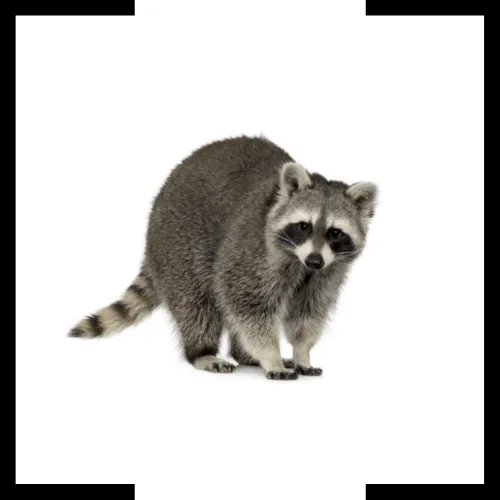Raccoon Trapping & Control
A unique creature that can be found just about anywhere, raccoons have spread from mostly forest habitats to mountainous, coastal, and urban areas. They are known for their dexterous front paws, ringed tails, and the dark stripe around their eyes.
The dark stripe, which is thought to help them identify each other’s facial expressions, is one of the main factors contributing to their reputation for being sneaky. These features were themes in mythologies of Native Americans such as the Lenape and Iroquois, where the raccoon is considered a trickster, engaging in lighthearted mischief.
The word “raccoon” even comes from the Algonquian Indian word “arakun,” which means “he scratches with his hands.” Sometime in the 1700s, however, the name became “raccoon”. Once thought to be solitary creatures, it has since been discovered that raccoons live in gender-specific groupings, with related females living together and males in groups of up to four to maintain their status come mating season.

They are nocturnal creatures, coming out to feed at night and aided by excellent night-vision. Their handlike front paws have long, nimble fingers used to skim the bottoms of streams for food, climb, and open containers and garbage cans. They are highly intelligent creatures, shown to remember solutions to problems after three years, and have been known to find their way into homes looking for food and shelter. They are also strong climbers and swimmers, allowing them to find food in trees and riverbeds. Their acute sense of hearing protects them from predators and aids in avoiding people.
Because raccoons eat just about anything, they search for it everywhere. They leave large messes in their searches, leading to very unsanitary clean-ups. They can open doors and windows or break into food storage containers with their dexterous fingers. Even worse, they may carry many different diseases, from viruses to bacteria and parasites, spreading them in numerous ways. This includes contaminating the food they get into with their urine. Their feces can spread diseases like rabies, raccoon parvoviral enteritis, canine distemper, pseudorabies, and infectious canine hepatitis.
If a raccoon makes its way into your house, attic, basement, or shed, it can be very destructive and quickly cause a lot of damage. They have a short gestational period, just over two months, so if their presence isn’t taken care of quickly, the problem can get out of control before you realize it’s there.
When you move into a new place, you see it as a peaceful place to live your life. Unfortunately for you, several critters agree with you (although not peaceful for you) and want to be permanent roommates. Luckily for residents of Sullivan and the surrounding area, Advanced Wildlife Control is ready to remove your unwanted intruders. Contact us today for an estimate and to schedule an inspection with no mouse too small and no raccoon too big.
